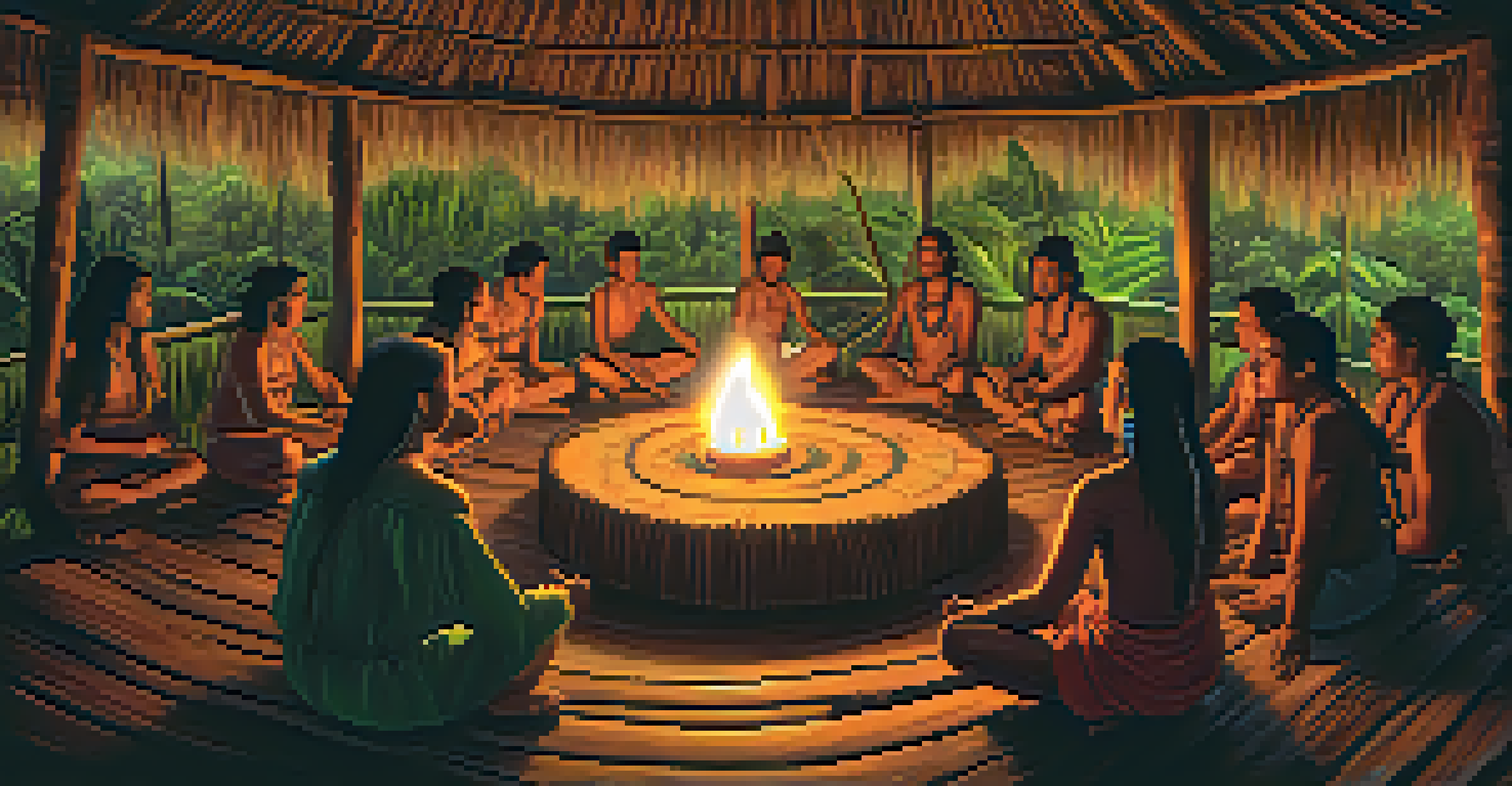Cultural Perspectives on Healing Through Ayahuasca

Understanding Ayahuasca: A Brief Overview
Ayahuasca is a traditional Amazonian brew made from two plants, primarily the Banisteriopsis caapi vine and the Psychotria viridis leaf. This concoction has been used for centuries by indigenous cultures for spiritual and healing purposes. Beyond its psychoactive properties, ayahuasca is steeped in rich cultural significance, often seen as a conduit for connecting with the divine.
Ayahuasca is a teacher, a mirror, and a guide, helping us to confront our innermost fears and desires.
In these cultural contexts, the experience of drinking ayahuasca is often guided by a shaman, who plays a crucial role in facilitating the journey. The shaman's expertise not only helps navigate the often intense psychological landscapes but also ensures the safety and well-being of participants. This relationship underscores the communal aspect of healing, where individual journeys are shared within a larger cultural framework.
As ayahuasca gains popularity in Western societies, understanding its roots becomes increasingly important. The brew is not merely a means to an end; it embodies a holistic approach to healing, which intertwines mind, body, and spirit. This rich tapestry of cultural practices surrounding ayahuasca invites us to explore its deeper meanings and implications.
The Role of Indigenous Communities in Ayahuasca Healing
Indigenous communities in the Amazon have been the custodians of ayahuasca practices for generations. Their deep understanding of the brew's effects and the rituals surrounding it form a vital part of their cultural identity. These communities often view ayahuasca as a sacred tool for healing, enlightenment, and communion with nature.

For these cultures, healing is not just a physical process; it is also spiritual and communal. The ceremonies are often collective experiences, emphasizing the importance of community support in the healing journey. This perspective contrasts sharply with the more individualistic approaches often seen in Western medicine, highlighting the significance of shared experiences.
Ayahuasca's Cultural Significance
Ayahuasca is deeply rooted in indigenous cultures, serving as a sacred tool for healing and spiritual connection.
Furthermore, as ayahuasca becomes more recognized globally, concerns arise regarding cultural appropriation and the commercialization of these sacred practices. It's essential to respect the traditions of indigenous peoples and acknowledge their contributions to the understanding of ayahuasca, ensuring that their voices remain central in discussions surrounding its use.
Ayahuasca: A Tool for Psychological Healing
Many people turn to ayahuasca in search of psychological healing, particularly for issues like depression, anxiety, and trauma. Anecdotal evidence suggests that participants often report profound shifts in their mental health following ayahuasca ceremonies. These experiences can lead to increased self-awareness and a deeper understanding of one's emotions.
The greatest gift we can give ourselves is the opportunity to heal, to grow, and to discover who we truly are.
The brew's psychoactive properties, primarily due to the compound DMT (dimethyltryptamine), facilitate introspection and emotional release. Participants frequently describe encounters with their past, allowing them to confront unresolved issues and traumas. This cathartic process can be incredibly transformative, leading to lasting positive changes in mental health.
However, it's crucial to approach ayahuasca as a complement to, rather than a substitute for, traditional mental health treatments. While many find solace in its effects, professional guidance and support remain essential for those dealing with severe psychological conditions. This balanced approach can help ensure that individuals benefit from the healing properties of ayahuasca safely.
Spiritual Insights and Personal Transformation
Beyond psychological healing, many individuals seek out ayahuasca for spiritual growth and personal transformation. Participants often report experiences of profound connection to the universe, nature, and a greater sense of purpose. These insights can lead to significant life changes, prompting individuals to reevaluate their priorities and relationships.
The spiritual aspect of ayahuasca is deeply rooted in the cultural traditions of the Amazon. For many indigenous practitioners, the brew opens pathways to communicate with spirits and ancestors, providing guidance and wisdom. This spiritual dimension is often what draws Westerners to explore ayahuasca, seeking connections beyond the material world.
Psychological Healing Potential
Many individuals seek ayahuasca for its reported ability to facilitate profound psychological healing and self-discovery.
As participants navigate their journeys, they often emerge with a renewed sense of clarity and intention. This transformative process can inspire individuals to pursue more meaningful lives, fostering a desire to contribute positively to their communities. Ultimately, ayahuasca serves as a catalyst for self-discovery, encouraging individuals to explore their true selves.
Cultural Perspectives: Western vs. Indigenous Views
The reception of ayahuasca varies significantly between indigenous and Western cultures. Indigenous communities view the brew as a sacred gift from the earth, integral to their spiritual and medicinal practices. In contrast, many in the West approach ayahuasca primarily as a tool for personal development or recreational use, often overlooking its cultural significance.
This divergence in perspectives can lead to misunderstandings and misinterpretations of ayahuasca's role in healing. While Westerners may seek quick fixes to their problems, indigenous practices emphasize patience, respect, and the importance of the ceremonial context. This contrast highlights the need for cultural sensitivity when discussing ayahuasca and its applications.
Engaging with ayahuasca through a respectful lens can enhance the experience for those seeking healing. By acknowledging the rich cultural heritage and the wisdom of indigenous practices, individuals can foster a deeper connection with the brew and its potential benefits. This approach not only honors the traditions but also enriches the personal journey.
Risks and Considerations in Ayahuasca Use
While ayahuasca has garnered attention for its potential healing properties, it is not without risks. The brew can provoke intense psychological experiences that may be overwhelming for some individuals. Those with pre-existing mental health conditions should exercise caution and consult healthcare professionals before participating in ceremonies.
Additionally, the safety of ayahuasca ceremonies can vary widely, especially outside of traditional settings. Some facilitators may lack the necessary training or experience, leading to potentially dangerous situations. It’s crucial for participants to research and choose reputable facilitators who prioritize safety and ethical practices.
Risks and Ethical Considerations
While ayahuasca can offer benefits, it also carries risks, emphasizing the need for caution and respect for indigenous practices.
Moreover, the physical effects of ayahuasca can include nausea and vomiting, which are often considered part of the purging process. While many view this as a cleansing ritual, it can be distressing for newcomers. Understanding these potential challenges is essential for anyone considering an ayahuasca journey, ensuring they are well-prepared and informed.
The Future of Ayahuasca in Global Healing Practices
As interest in ayahuasca continues to grow worldwide, its role in global healing practices is evolving. Many are advocating for a more integrated approach that respects and honors indigenous traditions while recognizing the brew's potential benefits. This dialogue is crucial for ensuring that ayahuasca is utilized ethically and sustainably in contemporary healing contexts.
Moreover, the increasing popularity of ayahuasca has sparked conversations about mental health and spirituality in many societies. As individuals seek alternatives to conventional therapies, ayahuasca presents a unique intersection of psychological and spiritual healing. This trend encourages a broader understanding of wellness that encompasses various perspectives on health.

Looking ahead, it’s vital to promote responsible and informed use of ayahuasca, safeguarding its cultural heritage and ensuring that indigenous voices are heard. By fostering respectful dialogue and collaboration, we can create a future where ayahuasca is appreciated not just as a substance but as a profound cultural practice with the potential to heal and transform.